CQUniversity: Abolition of Compulsory Voting in Australia - MGMT20135
VerifiedAdded on 2022/11/17
|5
|1124
|383
Report
AI Summary
This report provides a comprehensive analysis of the arguments for abolishing compulsory voting in Australia. It begins by defining compulsory voting and its historical context in Australia, then delves into the core arguments supporting its abolition. The report highlights concerns about infringement of individual rights, the potential for uninformed voting, and the impact on the legitimacy of elected representatives. It examines the effect of compulsion on voter behavior, the quality of political representation, and the responsiveness of political parties. The report synthesizes academic research and scholarly perspectives to present a balanced view. It concludes with a recommendation for abolishing compulsory voting and its potential benefits for the exercise of fundamental rights, democratic processes, and the quality of governance in Australia.
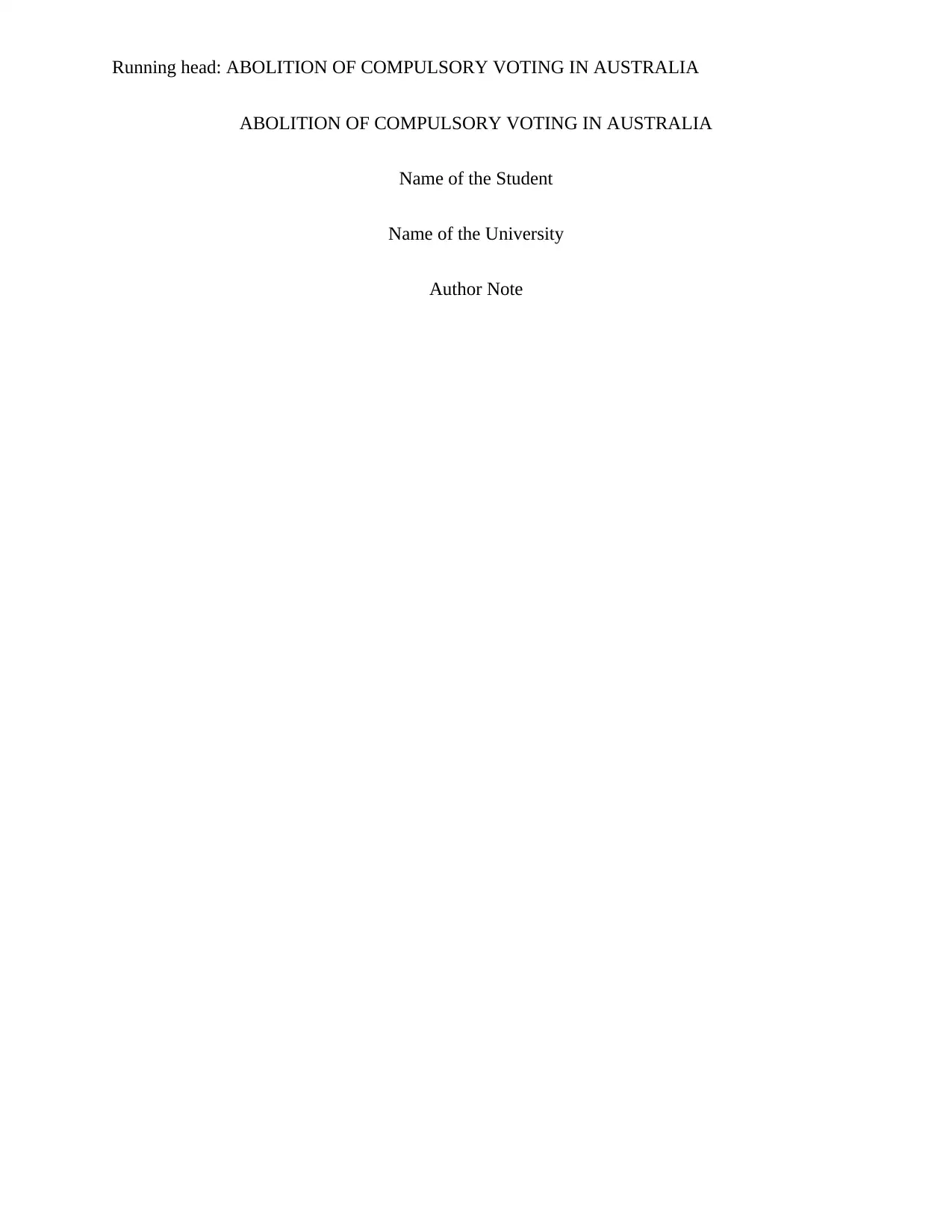
Running head: ABOLITION OF COMPULSORY VOTING IN AUSTRALIA
ABOLITION OF COMPULSORY VOTING IN AUSTRALIA
Name of the Student
Name of the University
Author Note
ABOLITION OF COMPULSORY VOTING IN AUSTRALIA
Name of the Student
Name of the University
Author Note
Paraphrase This Document
Need a fresh take? Get an instant paraphrase of this document with our AI Paraphraser
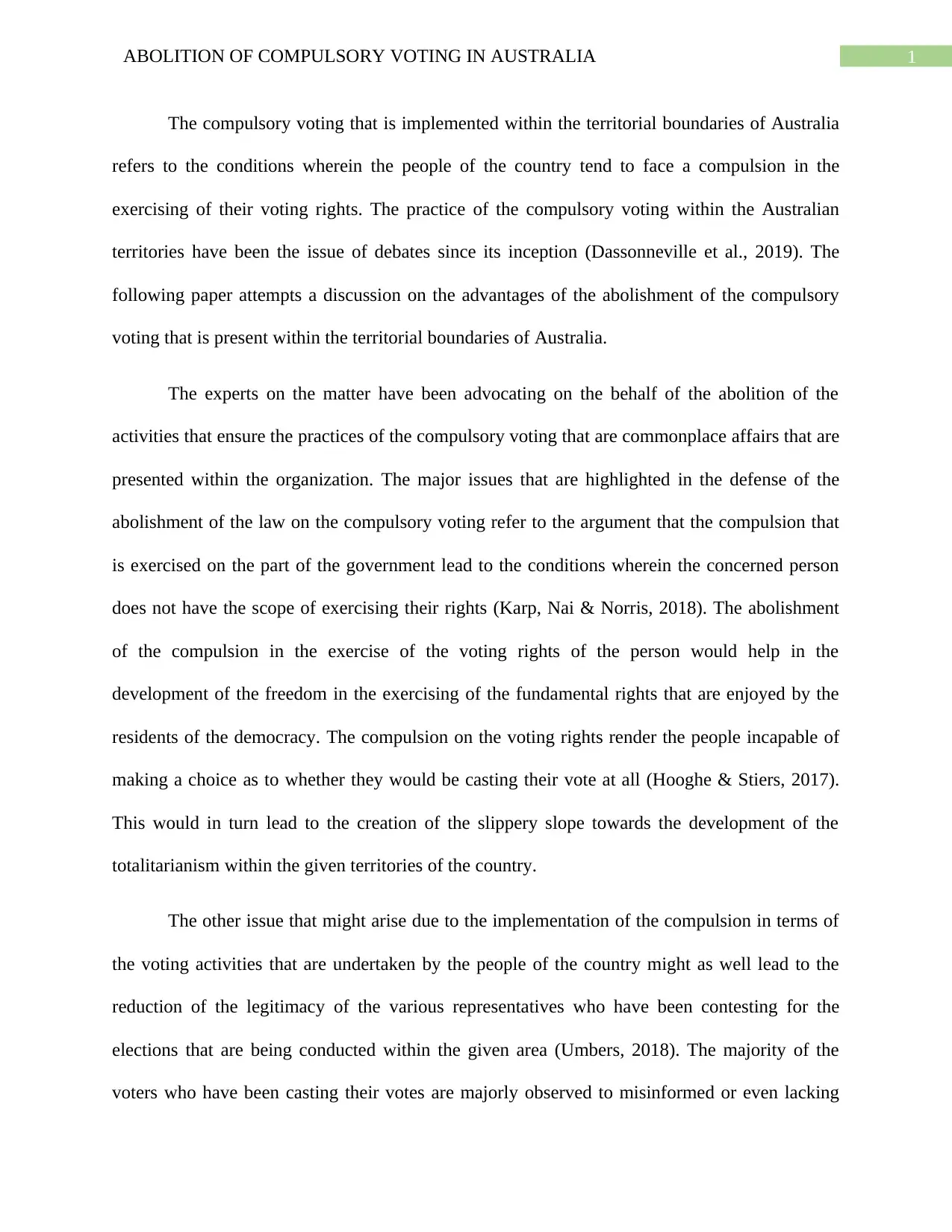
1ABOLITION OF COMPULSORY VOTING IN AUSTRALIA
The compulsory voting that is implemented within the territorial boundaries of Australia
refers to the conditions wherein the people of the country tend to face a compulsion in the
exercising of their voting rights. The practice of the compulsory voting within the Australian
territories have been the issue of debates since its inception (Dassonneville et al., 2019). The
following paper attempts a discussion on the advantages of the abolishment of the compulsory
voting that is present within the territorial boundaries of Australia.
The experts on the matter have been advocating on the behalf of the abolition of the
activities that ensure the practices of the compulsory voting that are commonplace affairs that are
presented within the organization. The major issues that are highlighted in the defense of the
abolishment of the law on the compulsory voting refer to the argument that the compulsion that
is exercised on the part of the government lead to the conditions wherein the concerned person
does not have the scope of exercising their rights (Karp, Nai & Norris, 2018). The abolishment
of the compulsion in the exercise of the voting rights of the person would help in the
development of the freedom in the exercising of the fundamental rights that are enjoyed by the
residents of the democracy. The compulsion on the voting rights render the people incapable of
making a choice as to whether they would be casting their vote at all (Hooghe & Stiers, 2017).
This would in turn lead to the creation of the slippery slope towards the development of the
totalitarianism within the given territories of the country.
The other issue that might arise due to the implementation of the compulsion in terms of
the voting activities that are undertaken by the people of the country might as well lead to the
reduction of the legitimacy of the various representatives who have been contesting for the
elections that are being conducted within the given area (Umbers, 2018). The majority of the
voters who have been casting their votes are majorly observed to misinformed or even lacking
The compulsory voting that is implemented within the territorial boundaries of Australia
refers to the conditions wherein the people of the country tend to face a compulsion in the
exercising of their voting rights. The practice of the compulsory voting within the Australian
territories have been the issue of debates since its inception (Dassonneville et al., 2019). The
following paper attempts a discussion on the advantages of the abolishment of the compulsory
voting that is present within the territorial boundaries of Australia.
The experts on the matter have been advocating on the behalf of the abolition of the
activities that ensure the practices of the compulsory voting that are commonplace affairs that are
presented within the organization. The major issues that are highlighted in the defense of the
abolishment of the law on the compulsory voting refer to the argument that the compulsion that
is exercised on the part of the government lead to the conditions wherein the concerned person
does not have the scope of exercising their rights (Karp, Nai & Norris, 2018). The abolishment
of the compulsion in the exercise of the voting rights of the person would help in the
development of the freedom in the exercising of the fundamental rights that are enjoyed by the
residents of the democracy. The compulsion on the voting rights render the people incapable of
making a choice as to whether they would be casting their vote at all (Hooghe & Stiers, 2017).
This would in turn lead to the creation of the slippery slope towards the development of the
totalitarianism within the given territories of the country.
The other issue that might arise due to the implementation of the compulsion in terms of
the voting activities that are undertaken by the people of the country might as well lead to the
reduction of the legitimacy of the various representatives who have been contesting for the
elections that are being conducted within the given area (Umbers, 2018). The majority of the
voters who have been casting their votes are majorly observed to misinformed or even lacking
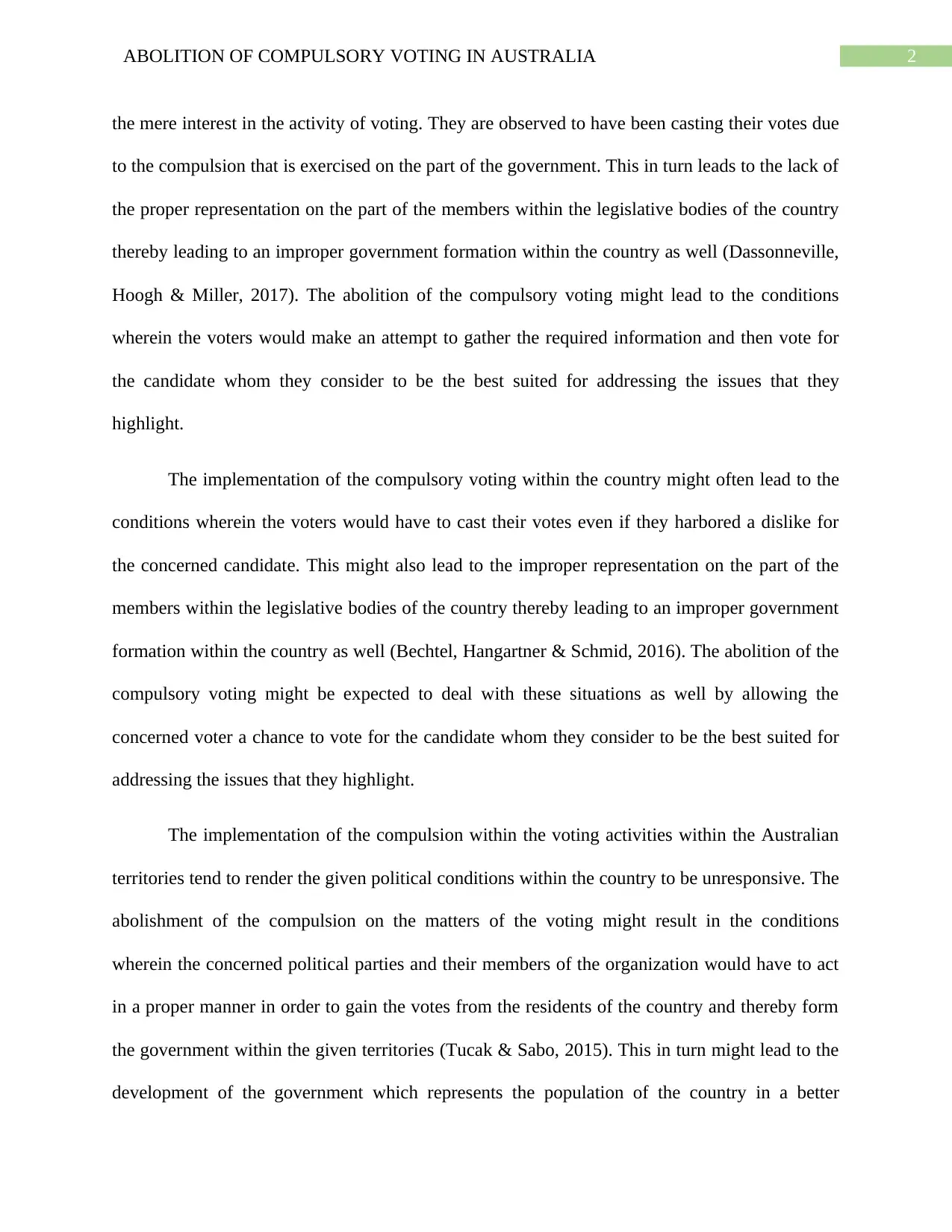
2ABOLITION OF COMPULSORY VOTING IN AUSTRALIA
the mere interest in the activity of voting. They are observed to have been casting their votes due
to the compulsion that is exercised on the part of the government. This in turn leads to the lack of
the proper representation on the part of the members within the legislative bodies of the country
thereby leading to an improper government formation within the country as well (Dassonneville,
Hoogh & Miller, 2017). The abolition of the compulsory voting might lead to the conditions
wherein the voters would make an attempt to gather the required information and then vote for
the candidate whom they consider to be the best suited for addressing the issues that they
highlight.
The implementation of the compulsory voting within the country might often lead to the
conditions wherein the voters would have to cast their votes even if they harbored a dislike for
the concerned candidate. This might also lead to the improper representation on the part of the
members within the legislative bodies of the country thereby leading to an improper government
formation within the country as well (Bechtel, Hangartner & Schmid, 2016). The abolition of the
compulsory voting might be expected to deal with these situations as well by allowing the
concerned voter a chance to vote for the candidate whom they consider to be the best suited for
addressing the issues that they highlight.
The implementation of the compulsion within the voting activities within the Australian
territories tend to render the given political conditions within the country to be unresponsive. The
abolishment of the compulsion on the matters of the voting might result in the conditions
wherein the concerned political parties and their members of the organization would have to act
in a proper manner in order to gain the votes from the residents of the country and thereby form
the government within the given territories (Tucak & Sabo, 2015). This in turn might lead to the
development of the government which represents the population of the country in a better
the mere interest in the activity of voting. They are observed to have been casting their votes due
to the compulsion that is exercised on the part of the government. This in turn leads to the lack of
the proper representation on the part of the members within the legislative bodies of the country
thereby leading to an improper government formation within the country as well (Dassonneville,
Hoogh & Miller, 2017). The abolition of the compulsory voting might lead to the conditions
wherein the voters would make an attempt to gather the required information and then vote for
the candidate whom they consider to be the best suited for addressing the issues that they
highlight.
The implementation of the compulsory voting within the country might often lead to the
conditions wherein the voters would have to cast their votes even if they harbored a dislike for
the concerned candidate. This might also lead to the improper representation on the part of the
members within the legislative bodies of the country thereby leading to an improper government
formation within the country as well (Bechtel, Hangartner & Schmid, 2016). The abolition of the
compulsory voting might be expected to deal with these situations as well by allowing the
concerned voter a chance to vote for the candidate whom they consider to be the best suited for
addressing the issues that they highlight.
The implementation of the compulsion within the voting activities within the Australian
territories tend to render the given political conditions within the country to be unresponsive. The
abolishment of the compulsion on the matters of the voting might result in the conditions
wherein the concerned political parties and their members of the organization would have to act
in a proper manner in order to gain the votes from the residents of the country and thereby form
the government within the given territories (Tucak & Sabo, 2015). This in turn might lead to the
development of the government which represents the population of the country in a better
⊘ This is a preview!⊘
Do you want full access?
Subscribe today to unlock all pages.

Trusted by 1+ million students worldwide
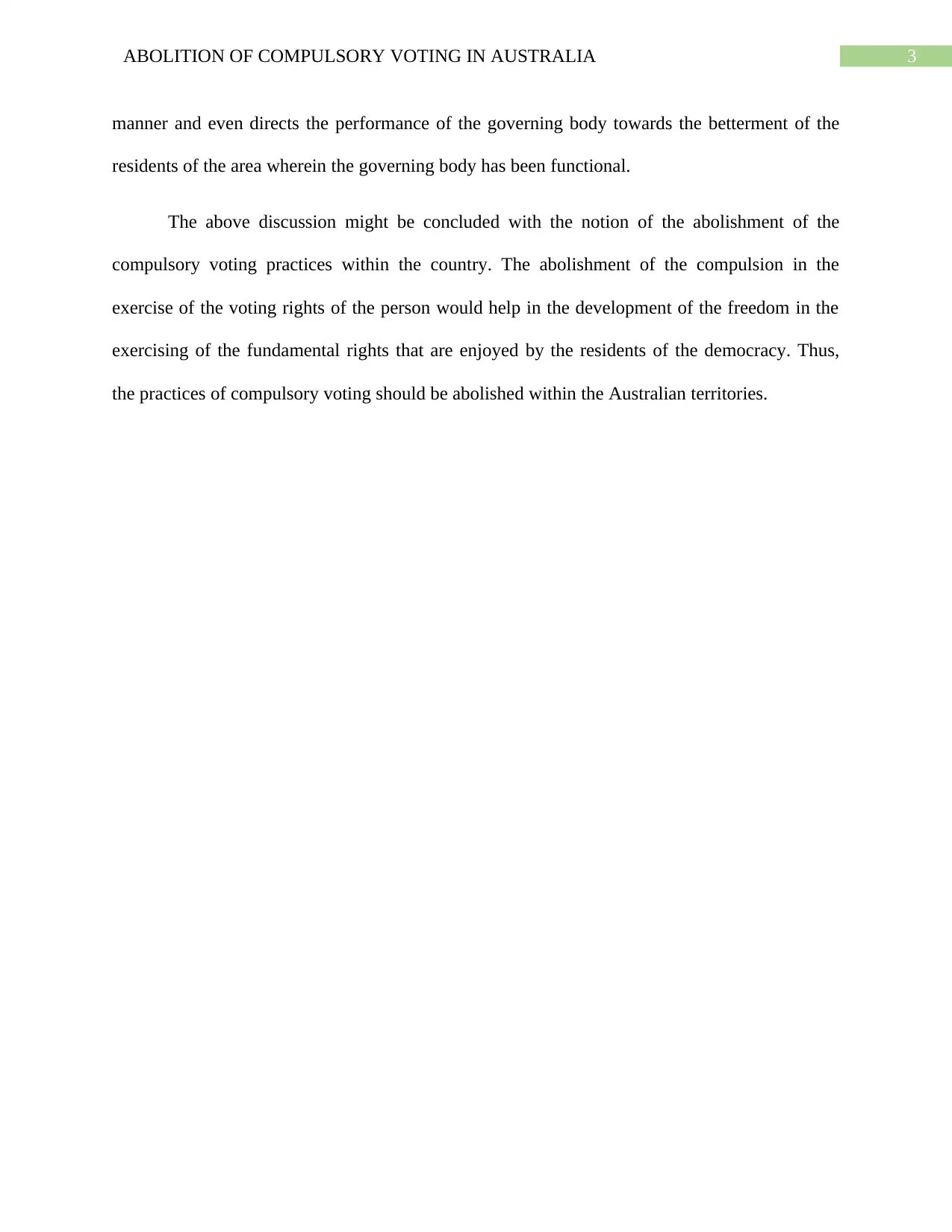
3ABOLITION OF COMPULSORY VOTING IN AUSTRALIA
manner and even directs the performance of the governing body towards the betterment of the
residents of the area wherein the governing body has been functional.
The above discussion might be concluded with the notion of the abolishment of the
compulsory voting practices within the country. The abolishment of the compulsion in the
exercise of the voting rights of the person would help in the development of the freedom in the
exercising of the fundamental rights that are enjoyed by the residents of the democracy. Thus,
the practices of compulsory voting should be abolished within the Australian territories.
manner and even directs the performance of the governing body towards the betterment of the
residents of the area wherein the governing body has been functional.
The above discussion might be concluded with the notion of the abolishment of the
compulsory voting practices within the country. The abolishment of the compulsion in the
exercise of the voting rights of the person would help in the development of the freedom in the
exercising of the fundamental rights that are enjoyed by the residents of the democracy. Thus,
the practices of compulsory voting should be abolished within the Australian territories.
Paraphrase This Document
Need a fresh take? Get an instant paraphrase of this document with our AI Paraphraser
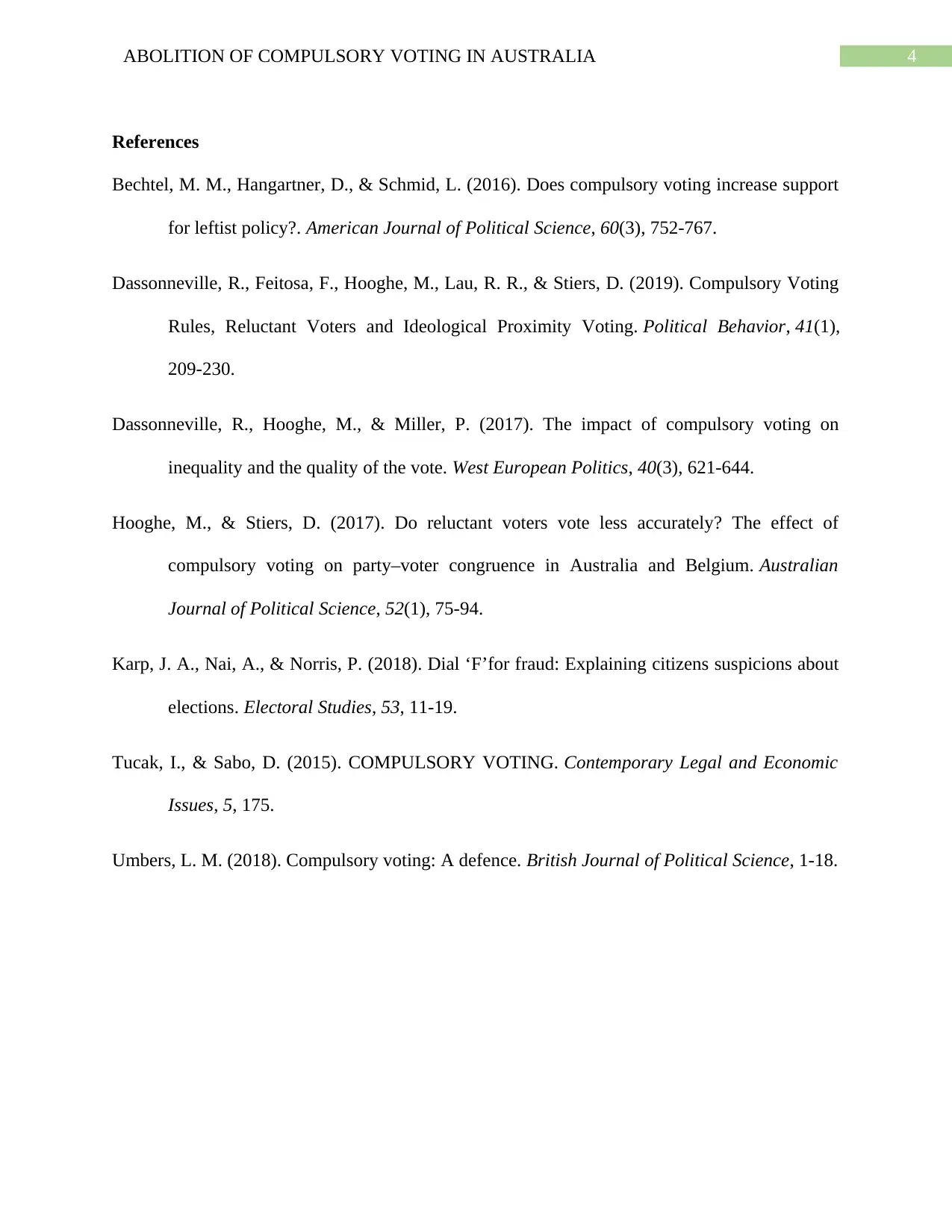
4ABOLITION OF COMPULSORY VOTING IN AUSTRALIA
References
Bechtel, M. M., Hangartner, D., & Schmid, L. (2016). Does compulsory voting increase support
for leftist policy?. American Journal of Political Science, 60(3), 752-767.
Dassonneville, R., Feitosa, F., Hooghe, M., Lau, R. R., & Stiers, D. (2019). Compulsory Voting
Rules, Reluctant Voters and Ideological Proximity Voting. Political Behavior, 41(1),
209-230.
Dassonneville, R., Hooghe, M., & Miller, P. (2017). The impact of compulsory voting on
inequality and the quality of the vote. West European Politics, 40(3), 621-644.
Hooghe, M., & Stiers, D. (2017). Do reluctant voters vote less accurately? The effect of
compulsory voting on party–voter congruence in Australia and Belgium. Australian
Journal of Political Science, 52(1), 75-94.
Karp, J. A., Nai, A., & Norris, P. (2018). Dial ‘F’for fraud: Explaining citizens suspicions about
elections. Electoral Studies, 53, 11-19.
Tucak, I., & Sabo, D. (2015). COMPULSORY VOTING. Contemporary Legal and Economic
Issues, 5, 175.
Umbers, L. M. (2018). Compulsory voting: A defence. British Journal of Political Science, 1-18.
References
Bechtel, M. M., Hangartner, D., & Schmid, L. (2016). Does compulsory voting increase support
for leftist policy?. American Journal of Political Science, 60(3), 752-767.
Dassonneville, R., Feitosa, F., Hooghe, M., Lau, R. R., & Stiers, D. (2019). Compulsory Voting
Rules, Reluctant Voters and Ideological Proximity Voting. Political Behavior, 41(1),
209-230.
Dassonneville, R., Hooghe, M., & Miller, P. (2017). The impact of compulsory voting on
inequality and the quality of the vote. West European Politics, 40(3), 621-644.
Hooghe, M., & Stiers, D. (2017). Do reluctant voters vote less accurately? The effect of
compulsory voting on party–voter congruence in Australia and Belgium. Australian
Journal of Political Science, 52(1), 75-94.
Karp, J. A., Nai, A., & Norris, P. (2018). Dial ‘F’for fraud: Explaining citizens suspicions about
elections. Electoral Studies, 53, 11-19.
Tucak, I., & Sabo, D. (2015). COMPULSORY VOTING. Contemporary Legal and Economic
Issues, 5, 175.
Umbers, L. M. (2018). Compulsory voting: A defence. British Journal of Political Science, 1-18.
1 out of 5
Related Documents
Your All-in-One AI-Powered Toolkit for Academic Success.
+13062052269
info@desklib.com
Available 24*7 on WhatsApp / Email
![[object Object]](/_next/static/media/star-bottom.7253800d.svg)
Unlock your academic potential
Copyright © 2020–2026 A2Z Services. All Rights Reserved. Developed and managed by ZUCOL.





